Editor’s note: This article is republished from the NACADA Academic Advising Today.
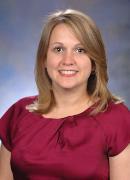
By Kristy Spear, UF Honors Program Advisor
Busyness has become a measure of worth in our society, and involvement in academics is not criteria for exemption from this trend. The focus of the college experience has shifted from a time of intellectual growth and development to a measure of how much can be accomplished in four years and how it will look to “this” employer or “that” graduate school. High-achieving students push to find opportunities for involvement and intellectual challenge based on internal interest, external pressure, and the societal myth that if they are not doing something productive, time is being wasted. Furthermore, for many high-achieving students, the notoriety associated with highly selective opportunities can be more appealing than the experience itself. Their eagerness, ambition, and high expectations of themselves and the college experience (Achterberg, 2005) propel this obsession with being constantly busy for fear that they may be missing out. They are driven by their varied intellectual interests and profound love of learning (Wilcox, 2013) which lead to a series of competing priorities, a conflict that will likely follow them throughout life. Helping high-achieving students develop the skills required to set a steady, productive pace while maintaining a sustainable workload is the most valuable lesson advisors can impart on this population.
To identify a manageable pace, students must constantly evaluate goals and experiences using two metrics: speed and control. Gauging speed and control from an outside perspective is challenging. It requires advisors to listen deeply and unassumingly, ask meaningful questions, and remove all biases about ideal pace. Speed and control are individualistic, subjective, and can change from day to day. What seems like a demanding, overburdened schedule for one student may be too slow for another. This issue presents itself regularly with high-achieving students who exhibit multipotentiality (the ability to excel in multiple fields of study) and seek simultaneity. Advisors should not discourage students from pursuing a demanding schedule if the student is in control. Instead, advisors must work with students to cultivate cognizance of the two metrics as losing control and being busy without purpose can have serious physical, mental, and professional repercussions. There are many strategies to address pace with high-achieving students; the most impactful are reflection and mindfulness.
Determining a manageable pace requires a self-awareness that can only be garnered through reflection, and busyness has a tendency to stand in the way of that process. Without constant, ongoing evaluation, students overlook the present and forget to think about what they are doing and, more importantly, why. Assessing the purpose and demands of each experience and learning when to say no are essential tools for monitoring speed and remaining in control. Advisors must engage students in dialogue that encourages reflection and articulated learning. Asking questions about what the student learned, how they learned it, why that information matters, and in what ways that information will be used moving forward (Ash & Clay, 2004), is an easy way to begin a meaningful conversation on involvement and pace. This concept aligns closely with Kolb’s Experiential Learning Theory, a flowing framework that advisors can use to help students analyze and apply what they learn from experience. The Experiential Learning Cycle encourages gathering experiences, reflecting on observations, conceptualizing new approaches, and using that information for future experimentation (Kolb, 2014).
To further the conversation about pace, additional questions may include:
Who is setting your pace, you or someone else (peers, family, etc.)?
What do you have to do? What do you want to do?
Are you taking time to reflect on your experience?
Are you enjoying the things you are doing? If not, what steps can you take to fix that?
Are you missing out on unexpected opportunities because of your plan?
Beyond dialogue, advisors may also approach the idea of articulated and experiential learning through activities. Mapping is one technique to help students reflect on experiences and prioritize competing opportunities. Advisors can enlist think-aloud protocol to engage students in discussion during the mapping design process, or assign the activity as homework. Many high-achieving students enjoy using creative ingenuity to solve problems, and mapping can provide that outlet. Students may develop maps by hand or through mapping software, like Mind Meister (www.mindmeister.com). There are several types of maps that can be used to assess speed and control. New college students interested in strategically engaging in a number of opportunities throughout their undergraduate career may benefit from creating a Concept Map (Johnson, 2013) to help with purposeful planning. Wandering Maps, as described by Kate Brooks in her book You Majored in What: Mapping Your Path to Chaos and Career (2010), can help a student identify themes, define goals, and find avenues for opportunities. Mapping can provide a visual method to start dialogue and build meaningful conversations about pace.
Assessing values is another reflection technique that can be used to evaluate speed and control. Values drive involvement and decision-making. Processing values with a student provides a vehicle to explore motivation and determine why certain opportunities are important from personal and professional perspectives. By helping a student identify his or her values, advisors can assist in evaluating current and future involvement opportunities. If the student’s values do not align with current activities, it may also springboard a conversation about eliminating extraneous experiences that are not a good fit. There are several online resources available to assist with identifying values. MyPlan (www.myplan.com) offers a host of tests including a Values Assessment that students can complete free of charge. Values change, and reassessing them periodically is a helpful way to evaluate experiences and maintain a steady, manageable pace.
A SWOT analysis is one more approach that can also be used to address pacing issues with high-achieving students. This technique, often used by businesses for planning and evaluation, can help students sort experiences and determine which activities are worth continuing or pursuing. A SWOT analysis can be used to reflect on the strengths, weaknesses, opportunities, and threats associated with a student’s schedule. Experiences that are placed in the weaknesses and threats categories should be investigated and potentially abandoned to make room for opportunities.
Reflection and experiential learning can be approached metacognitively through mindfulness (Kolb & Yeganeh, 2012). For many students, the future and the past distracts from the present. Encouraging mindfulness addresses this concern. Mindfulness is an active awareness of the present moment. It involves seeing thoughts as thoughts and not literal events, accepting without judgement, remaining compassionate with one’s self, and recognizing that change is inevitable. These lessons are particularly salient to high-achieving students, who have a tendency to remain overly-focused on what they “need to do” and are devastated by perceived failures in those arenas. Self-compassion and openness to change can go a long way when setting a manageable pace. Mindfulness shifts the focus from what the student must do for the future, to what can be accomplished in the present, “enhancing presence and intentional attention” (Kolb, 2015). By using what the student has learned from experience and breaking the process down into easily digestible pieces, students will find relief from fear and anxiety that often accompany an overburdened schedule. S.T.O.P (Goldstein, 2013) is one way to walk a student through mindful practice:
Stop what you are doing and put things down for a minute
Take a few deep breaths
Observe experiences including thoughts, feelings, and emotions as they are
Proceed with something that will support you in the moment
Advisors can play a critical role in helping students evaluate experiences, practice mindfulness, and learn to scale back when necessary. Busyness is time consuming and, without conscious effort, leaves little room for reflection and mindfulness. For high-achieving students, there is always something more that can be done. Yet, what is the cost and what are these students sacrificing by being constantly busy? Brigid Schulte (2014) argues, “Even as neuroscience is beginning to show that at our most idle, our brains are most open to inspiration and creativity—and history proves that great works of art, philosophy and invention were created during leisure time—we resist taking time off.” Research has found statistical support for the idea that practicing mindfulness enhances mental and physical health as well as creativity (Kolb, 2015). Shifting the focus to the present can dramatically impact a student’s college experience. This argument is not an excuse for laziness, but an opportunity for self-compassion, open-mindedness, and unexpected opportunity. Students will be surprised by what they can accomplish when they give themselves a little free time.
Kristy Spear
Advisor
Honors Program
University of Florida
Kspear@honors.ufl.edu
References
Achterberg, C. (2005). What is an honors student? Journal of the National Collegiate Honors Council, 6(1), 75-81.
Ash, S. L. and Clayton, P. H. (2004). The articulated learning: An approach to guided reflection and assessment. Innovative Higher Education, 29(2), 137-154.
Brooks, K. (2010). You majored in what?: Mapping your path from chaos to career. New York, NY: Plume.
Goldstein, E. (2013, May 29). Stressing Out? S.T.O.P. Mindful. Retrieved from http://www.mindful.org/stressing-out-stop/
Kolb, D. A. and Yaganeh, B. (2012). Deliberate experiential learning: Mastering the art of learning from experience. In K. Elsbach, C. D. Kayes, & A. Kayes (Eds.), Contemporary organizational behavior in action (1st ed.). Upper Saddle River, NJ: Pearson Education.
Kolb, D. A. (2015). Experiential learning: Experience as the source of learning and development (2nd ed.). Upper Saddle River, NJ: Pearson Education.
Kolb, D. (2014). Experiential learning: Experience as the source of learning and development (2nd ed.). Upper Saddle River, NJ: Pearson Education.
Schulte, B. (2014, March 15). Why being too busy makes us feel so good. The Washington Post. Retrieved from https://www.washingtonpost.com/opinions/why-being-too-busy-makes-us-feel-so-good/2014/03/14/c098f6c8-9e81-11e3-a050-dc3322a94fa7_story.html
Johnson, M. (2013). Engaging honors students in purposeful planning through a concept mapping assignment [Paper 226]. Honors in Practice: Online Archive. Retrieved from http://digitalcommons.unl.edu/cgi/viewcontent.cgi?article=1225&context=nchchip
Wilcox, E. (2013). From obstacle course to launching pad: Advising high achievers, gifted learners and creative thinkers. Retrieved from http://advisingmatters.berkeley.edu/sites/default/files/re-edited_Final_Advising%20High%20Achievers_EW-12_09_13%20(2)_0.pdf
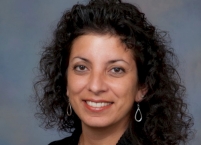

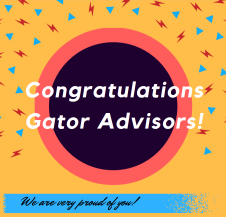
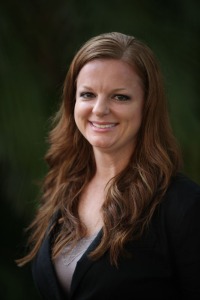 the best advisors of the Heavener School of Business, Melissa Forgione is a treasure. She’s fun, super sweet and definitely cares a lot about students. Melissa has been an advisor for three years now. Directly after finishing graduate school, one of Melissa’s friends had so much faith in her and persuaded her to take a temporary advising job. Years later she’s still advising and she loves it.
the best advisors of the Heavener School of Business, Melissa Forgione is a treasure. She’s fun, super sweet and definitely cares a lot about students. Melissa has been an advisor for three years now. Directly after finishing graduate school, one of Melissa’s friends had so much faith in her and persuaded her to take a temporary advising job. Years later she’s still advising and she loves it.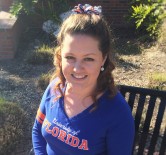
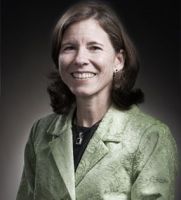 Last semester I met with Dr. Angela Lindner in the Office of the Associate Provost for Undergraduate Affairs office in Tigert, which she has definitely made her own. From the tasteful pillows to the bowl of single serve prunes (not to be mistaken for candy) the office felt inviting. In an open and candid manner, she answered the following questions.
Last semester I met with Dr. Angela Lindner in the Office of the Associate Provost for Undergraduate Affairs office in Tigert, which she has definitely made her own. From the tasteful pillows to the bowl of single serve prunes (not to be mistaken for candy) the office felt inviting. In an open and candid manner, she answered the following questions.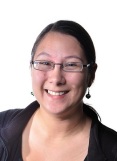 Mary Kate Meese
Mary Kate Meese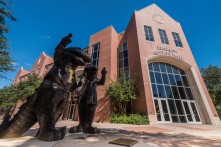
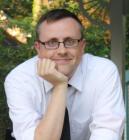
 On Thursday March 17th the UAC welcomed it’s newest members to the leadership, please take a moment to join me in welcoming them!
On Thursday March 17th the UAC welcomed it’s newest members to the leadership, please take a moment to join me in welcoming them!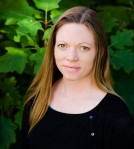 Chair – Christine Richmond
Chair – Christine Richmond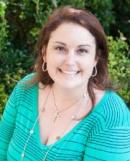 Advisor Certification Chair – Katherine Ivey
Advisor Certification Chair – Katherine Ivey
 Campus Affairs Chair – Sophie Spratley
Campus Affairs Chair – Sophie Spratley